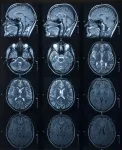Risk factors for a severe course of COVID-19 in people with diabetes
2021-04-29
(Press-News.org) People with diabetes are at increased risk of developing a severe course of COVID-19 compared to people without diabetes. The question to be answered is whether all people with diabetes have an increased risk of severe COVID-19, or whether specific risk factors can also be identified within this group. A new study by DZD researchers has now focused precisely on this question and gained relevant insights.
The COVID-19 pandemic poses unprecedented challenges to science and the health sector. While in some people with a SARS-CoV-2 infection the disease is hardly noticeable, in others it is much more severe and sometimes fatal. So far, knowledge about the course of a COVID-19 disease is still quite meager. However, diabetes has increasingly emerged as one of the risk factors determining the severity of the disease. Several studies on diabetes and SARS-CoV-2 have already observed an approximately two- to threefold increase in mortality due to COVID-19 in people with diabetes compared to people without diabetes. This makes it all the more important to conduct studies that examine the risk factors of people with diabetes for severe COVID-19 disease in more detail.
A new study of the German Diabetes Center, partner of the DZD, led by Dr. Sabrina Schlesinger, head of the junior research group Systematic Reviews at the Institute for Biometrics and Epidemiology, therefore examined the risk phenotypes of diabetes and their possible association with the severity of COVID-19. In their meta-analysis, the researchers combined the results from 22 published studies, so that a total of more than 17,500 people with diabetes and confirmed SARS-CoV-2 infection were included in this study. For individuals with diabetes and SARS-CoV-2 infection, male sex, older age (>65 years), high blood glucose levels (at the time of hospital admission), chronic treatment with insulin, and existing concomitant diseases (such as cardiovascular disease or kidney disease) were identified as risk factors for a severe COVID-19 course. On the other hand, the results showed that chronic metformin treatment was associated with a reduced risk of a severe course of COVID-19.
"This current systematic review and meta-analysis describes within the high-risk group, namely diabetes mellitus, those individuals with the highest risk of a severe COVID-19 course," said Professor Michael Roden, scientific director and board member of the German Diabetes Center. "These results will help to classify individuals with diabetes even better in order to improve their therapy and mitigate the course."
The risk factors identified in the study - i.e. older persons, usually male, with comorbidities of diabetes and chronic insulin treatment - can thus be seen as indicators of diabetes severity or overall poor health. "However, some results, especially on diabetes-specific factors such as type or duration of diabetes and further treatments, are still imprecisely assessed and the significance is low. In order to strengthen the significance, further primary studies are needed that examine these specific risk factors and consider other relevant influencing factors in their analysis," said Dr. Schlesinger. Her research team is therefore already working on a next version of this review: "This review presents the current study situation and will be updated regularly as long as new findings on this topic are available," said Dr. Schlesinger.
INFORMATION:
ELSE PRESS RELEASES FROM THIS DATE:
2021-04-29
Exposure before birth to persistent organic pollutants (POPs)-- organochlorine pesticides, industrial chemicals, etc.--may increase the risk in adolescence of metabolic disorders, such as obesity and high blood pressure. This was the main conclusion of a study by the Barcelona Institute for Global Health (ISGlobal), a research centre supported by the "la Caixa" Foundation. The study was based on data from nearly 400 children living in Menorca, who were followed from before birth until they reached 18 years of age.
POPs are toxic, degradation-resistant ...
2021-04-29
A top-level international research team including researchers from the University of Eastern Finland has developed a new algorithm for the diagnostics of dementia. The algorithm is based on blood and cerebrospinal fluid biomarker measurements. These biomarkers can be used to aid setting of an exact diagnosis already in the early phases of dementia.
Researchers from the University of Eastern Finland and the University of Oulu in collaboration with an international team have created a new diagnostic biomarker-based algorithm for the diagnostics of dementia. The team is led by Professor Barbara Borroni from the University of Brescia, Italy. The article was published in the Diagnostics journal.
The accurate diagnosis ...
2021-04-29
The proliferation of electric cars, smartphones, and portable devices is leading to an estimated 25 percent increase globally in the manufacturing of rechargeable batteries each year. Many raw materials used in the batteries, such as cobalt, may soon be in short supply. The European Commission is preparing a new battery decree, which would require the recycling of 95 percent of the cobalt in batteries. Yet existing battery recycling methods are far from perfect.
Researchers at Aalto University have now discovered that electrodes in lithium batteries containing cobalt can be reused as is after being newly saturated with lithium. In comparison to traditional recycling, which typically ...
2021-04-29
Glaciers are a sensitive indicator of climate change - and one that can be easily observed. Regardless of altitude or latitude, glaciers have been melting at a high rate since the mid-?20th century. Until now, however, the full extent of ice loss has only been partially measured and understood. Now an international research team led by ETH Zurich and the University of Toulouse has authored a comprehensive study on global glacier retreat, which was published online in Nature on 28 April. This is the first study to include all the world's glaciers - around 220,000 in total - excluding the Greenland and Antarctic ice sheets. The study's spatial and temporal resolution is unprecedented - and shows how rapidly glaciers have lost thickness and mass over the past two decades.
Rising sea levels ...
2021-04-29
Spreading of the seafloor in the Red Sea basin is found to have begun along its entire length around 13 million years ago, making its underlying oceanic crust twice as old as previously believed.
The formation history and age of the Red Sea basin has long been contested, largely because the crust under the sea is widely overlain by thick layers of salt and sediment, making it difficult to observe directly.
"Existing geological models of the Red Sea often contradict each other, largely due to limited high-resolution data and the influence of overlaying salt layers," says Froukje van der Zwan from KAUST, who worked on the project. "For example, ...
2021-04-29
Lacticaseibacillus rhamnosus GG, or LGG, is the most studied probiotic bacterium in the world. However, its features are not perfect, as it is unable to utilise the milk carbohydrate lactose or break down the milk protein casein. This is why the bacterium grows poorly in milk and why it has to be separately added to probiotic dairy products.
In fact, attempts have been made to make L. rhamnosus GG better adjust to milk through genetic engineering. However, strict restrictions have prevented the use of such modified bacteria in human food.
Thanks to a recent breakthrough made at the University of Helsinki, Finland, with researchers from the National Institute for Biotechnology and Genetic ...
2021-04-29
When heavy ions, accelerated to the speed of light, collide with each other in the depths of European or American accelerators, quark-gluon plasma is formed for fractions of a second, or even its "cocktail" seasoned with other particles. According to scientists from the IFJ PAN, experimental data show that there are underestimated actors on the scene: photons. Their collisions lead to the emission of seemingly excess particles, the presence of which could not be explained.
Quark-gluon plasma is undoubtedly the most exotic state of matter thus far known to us. In the LHC at CERN near Geneva, it is formed during central collisions of two lead ions ...
2021-04-29
Older people with vision loss are significantly more likely to suffer mild cognitive impairment, which can be a precursor to dementia, according to a new study published in the journal Ageing Clinical and Experimental Research.
The research by Anglia Ruskin University (ARU) examined World Health Organisation data on more than 32,000 people and found that people with loss in both near and far vision were 1.7 times more likely to suffer from mild cognitive impairment.
People with impairment of their near vision were 1.3 times more likely to suffer from mild cognitive impairment than someone with no vision impairment.
However, people who reported ...
2021-04-29
CLEVELAND--Using ultra-high field magnetic resonance imaging (MRI) to map the brains of people with Down syndrome (DS), researchers from Case Western Reserve University, Cleveland Clinic, University Hospitals and other institutions detected subtle differences in the structure and function of the hippocampus--a region of the brain tied to memory and learning.
Such detailed mapping, made possible by the high-powered MRI, is significant because it allowed the research team to better understand how each subregion of the hippocampus in people with DS is functionally connected to other parts of the brain. ...
2021-04-29
A collaboration between experts and a Danish-based, global reaching patient organization has resulted in a groundbreaking medical publication, where guidelines are being presented on how to manage patients with unexplained low blood sugar.
Danielle Drachmann, founder of Ketotic Hypoglycemia International (KHI), spent years being dismissed by doctors due to the outdated perception that her children's dangerous low blood glucose (sugar) and high ketone levels were a normal variation.
Professor Henrik Christesen, Head of the Complex Hypoglycemia Center, Odense University Hospital, Denmark, could not identify the cause of the condition ...
LAST 30 PRESS RELEASES:
[Press-News.org] Risk factors for a severe course of COVID-19 in people with diabetes




